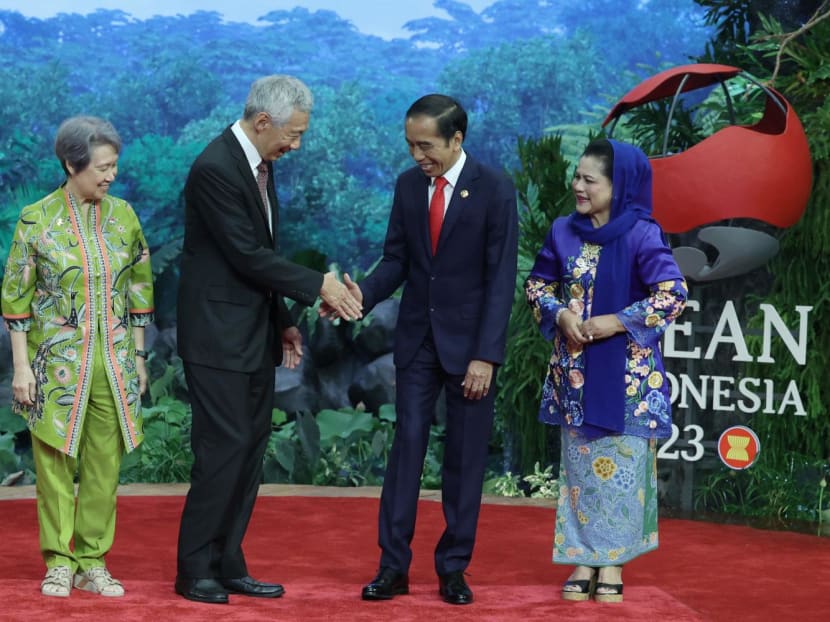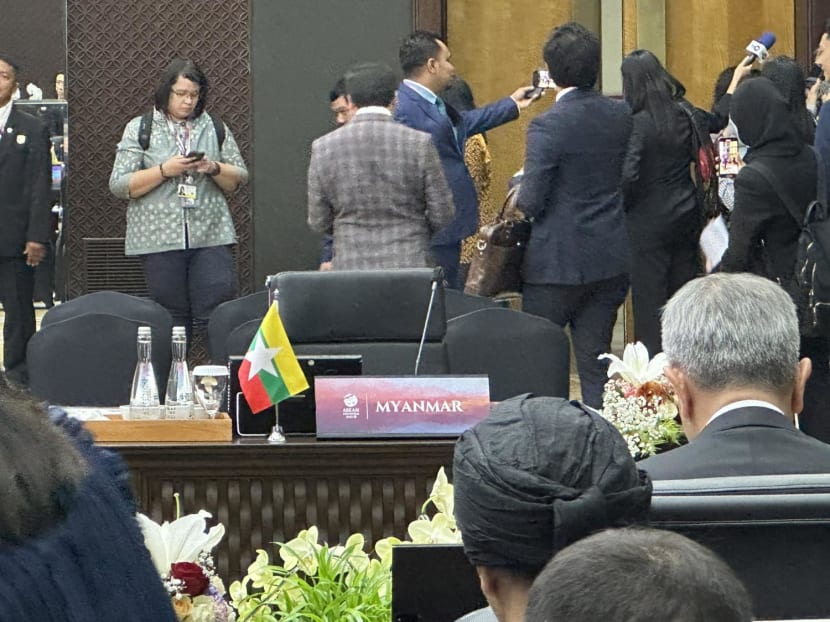PM Lee warns Asean risks irrelevance if 'passive' amid geopolitical tensions; calls for renewed push to resolve Myanmar crisis
JAKARTA — Asean risks losing relevance if the 10-nation grouping stays passive and avoids taking positions amid geopolitical tensions, said Prime Minister Lee Hsien Loong, who also called for a renewed push to tackle the crisis in Myanmar.

Prime Minister Lee Hsien greets Indonesian President Joko Widodo as their spouses look on at the Asean Summit in Jakarta on Sept 5, 2023.
- Asean risks irrelevance if the 10-nation grouping stays passive and avoids taking positions on issues amid geopolitical tensions, Prime Minister Lee Hsien Loong said on Tuesday (Sept 5)
- Mr Lee was speaking in Jakarta at the 43rd summit of the Association of Southeast Asian Nations (Asean) as he held meetings with regional leaders including Indonesia's President Joko Widodo
- 'We have to be prepared to engage all sides actively, in mutually beneficial ways,' Mr Lee said.
- Mr Lee also urged Asean to push for the full implementation of the Five-Point Consensus that serves to address the Myanmar crisis
JAKARTA — Asean risks losing relevance if the 10-nation grouping stays passive and avoids taking positions amid geopolitical tensions, said Prime Minister Lee Hsien Loong, who also called for a renewed push to tackle the crisis in Myanmar.
Mr Lee was speaking in Jakarta at the 43rd summit of the Association of Southeast Asian Nations (Asean) on Tuesday (Sept 5), as he held meetings with regional leaders including Indonesia's President Joko Widodo, often referred to as Jokowi.
In a speech at a leaders' retreat on the first day of the three-day summit, Mr Lee said that Asean has to accept that geopolitical rivalry "will play out in our region, as is happening elsewhere in the world".
Mr Lee did not refer directly to the United States and China, however that is one key rivalry that is dominating global affairs at present, along with Russia's invasion of Ukraine.
"The solution is not to remain passive and avoid taking positions on all issues," he said. "Otherwise, Asean risks losing its relevance."
"We have to be prepared to engage all sides actively, in mutually beneficial ways," Mr Lee said, adding that stepping up engagement with external partners in an open, inclusive way is one way for Asean can maintain its centrality.
"We will each have our own national interests and positions on the geopolitical challenges, but we still have to work towards common landing points. And this inevitably will involve all of us with some give and take."
He added in a separate point that Asean's "centrality" will have to be founded on unity of purpose and action.
"We have to be united in dealing with difficult issues, whether external or internal, for example the situation in Myanmar," he added.
Mr Lee mentioned the Myanmar crisis a second time in the short speech, lasting about five minutes.
Myanmar's democratically-elected government was overthrown in a military coup in February 2021. Since then, the military junta has killed many the nation's own citizens as they resist its rule.
Although Myanmar is a member of Asean, the regime is being frozen out by the grouping. Although a non-political representative can still attend the summit, Myanmar has remained unrepresented since the coup.
At the Jakarta meeting, a seat reserved for a Myanmar representative was vacant.

WHAT IS THE FIVE-POINT CONSENSUS ON MYANMAR?
The Five-Point Consensus is an agreement reached by Asean leaders in 2021, in the months following the coup regarding the situation in Myanmar.
The five points in the consensus are:
- For there to be immediate cessation of violence in Myanmar and for all parties shall exercise utmost restraint
- Constructive dialogue among all parties concerned to seek a peaceful solution in the interests of the people
- A special envoy of the Asean chair shall facilitate mediation of the dialogue process, with the assistance of the secretary-general of Asean
- Asean shall provide humanitarian assistance
- The special envoy and delegation shall visit Myanmar to meet with all parties concerned.
However, since the agreement among leaders on the consensus two years ago, there has been criticism on a lack of progress.
During the Asean foreign ministers’ meeting on Monday, Indonesia’s Foreign Minister Retno Marsudi said the insignificant progress in implementing Asean’s five-point consensus on Myanmar has “left a negative mark” on the grouping, and also overshadowed its progress on other efforts.
On Tuesday, Mr Lee hinted possible changes in the implementation of the Five-Point Consensus by Asean regarding the situation in Myanmar.
Speaking earlier on Tuesday morning in a plenary session at the summit, he also made suggestions on how to improve Asean's standing in the world through accelerating the growth of digital and green economies, and tackling cybersecurity threats and food insecurity, among other strategies.
The Asean Summit was the second iteration of the biannual summit, the first being held in May at Labuan Bajo, a fishing town in East Indonesia.
Those attending the summit included Cambodian Prime Minister Hun Manet, who had recently succeeded his father Hun Sen. Timor-Leste Prime Minister Xanana Gusmão was also in attendance at his first summit as an observer.
PUSH FOR FULL IMPLEMENTATION OF FIVE-POINT CONSENSUS: PM LEE
Mr Lee said on Tuesday that the security, economic, and humanitarian situation in Myanmar remains dire, and violence continues
Thus, he said that Asean must push for the full implementation of the Five-Point Consensus and maintain Myanmar’s non-political representation at Asean Summits and Foreign Ministers’ meetings.
"Otherwise, our credibility will be undermined, and so will Asean centrality," he said.
"And this would also affect our engagement with key partners, at a time precisely when we need to step up relations with them."
Mr Lee also hinted at changes to the implementation of the Five-Point Consensus, saying that he welcomed a draft of the latest proposal for implementing the Five-Point Consensus.
He said that the draft establishes "an informal consultation mechanism comprising the previous, current, and future Asean Chairs to engage all Myanmar stakeholders".
This would settle the issue of future Asean chairmanships, allowing Asean to continue its important agenda, notwithstanding the situation in Myanmar.
Indonesia is Asean chair this year with Laos slated for 2024.
In a statement shared on Tuesday by Asean, the bloc confirmed that the 2026 chair, which was originally slated for Myanmar, will be instead granted to the Philippines.
Mr Lee was building upon what had been discussed earlier this year in the Asean Summit at Labuan Bajo, where Asean leaders indicated their deep concern over the situation in Myanmar.
Indonesian President Joko Widodo said in May that the regional bloc will not give up on trying to end the violence in Myanmar despite having made no progress in the Five-Point Consensus.
Mr Lee on Tuesday also said that one way for Asean to better engage with the world was through the Asean Outlook on the Indo-Pacific, an affirmation by Asean to maintain peace and stability in the Indo-Pacific region.
He said that the outlook provides opportunities for partners to engage in the region.
PM LEE'S SUGGESTIONS ON STRENGTHENING ASEAN
Mr Lee made three suggestions on how to strengthen Asean.
Firstly, to promote economic integration, especially in "new growth areas" such as the digital and green economies.
This was a reiteration of a call that Mr Lee had made in May at the first iteration of the summit this year in Labaun Bajo.
Mr Lee said on Tuesday that it is important more progress is made on upgrading the Asean Trade in Goods Agreement, a trade agreement signed in 2009 aimed at reducing tariffs within Asean.
He said that the agreement needs to be extended to cover "emerging issues" such as the digital sphere, the environment and trade in crisis situations.
On the green economy, Mr Lee said that he welcomed the Joint Declaration on Sustainable Energy Security through Interconnectivity that the Energy Ministers in the region adopted last month, which aims to strengthen regional cooperation and energy security.
Efforts at green energy transition is crucial to the region's sustainable development and prosperity, said Mr Lee, adding that Singapore is also committed to an Asean Power Grid, an initiative to construct a regional power interconnection to connect the region.
However, beyond the Asean Power Grid, Mr Lee said that member nations should collaborate in other areas to enable a green transition, such as through carbon trading and capacity building, as well as collaborate with external partners who have greater expertise in such areas.
Secondly, Mr Lee added that Asean should strengthen it's ability to address emerging challenges. These include:
- Cybersecurity. The region must make more progress on the Asean Regional Computer Emergency Response Team, to strengthen the region's response to increasingly sophisticated cyber threats
- Food security. Singapore supports the Asean leaders’ push to strengthen food security and nutrition in the region, and will build on these efforts
Thirdly, Mr Lee said that Asean's institutions and processes must be "fit for purpose".
This means that the Asean Secretariat, formed by the foreign ministers of Asean nations to coordinate collaboration, must be strengthened, and the role of the Asean Secretary-General must be optimised, so that they can more effectively support Asean’s priorities
"Ultimately, a more integrated and well-functioning Asean strengthens our centrality, and enhances our relevance and competitiveness in a post-pandemic world," said Mr Lee.
Asean leaders will meet with external partners including during individual summits with countries such as the US, Australia, Canada, China, India, Japan, South Korea.
Chinese Premier Li Qiang will attend the summit while Vice-President Kamala Harris is representing the US.
Later on Tuesday, PM Lee met with Mr Klaus Schwab, founder and executive chairman of the World Economic Forum (WEF).
They discussed global and regional developments, and areas for public-private cooperation in areas such as artificial intelligence, cybersecurity, digital transformation and health.
Mr Lee also congratulated Prime Minister Samdech Hun Manet on his appointment as as Cambodia's PM, and reaffirmed Singapore’s longstanding ties with Cambodia.











